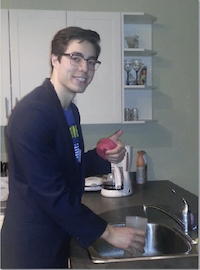I come from a small town named Acton. Having both my parents come from poverty, I lived in a cost conscious environment, which actually led me to living an environmentally conscious lifestyle. My showers were timed to a maximum of three minutes, I always composted my organic waste, and I always hand washed the dishes. My parents’ discipline for cost and environmental consciousness made me realize the excessive waste culture of a typical Westernized family. Thinking of all the waste that our day-to-day lives produce, it is not sustainable. Something needs to be done. And soon.
Additional Information
What is your personal definition of sustainability?
I define sustainability as the degree of perpetuation that a person, place, or thing can endure. In other words, “can our actions be maintained?” I believe when most people view sustainability, the environment instantly comes to mind, because it is a universal concern whose perpetuation affects the future survival of our species. Sustainability is far more than the environment. From a business perspective, sustainability can be seen as reviewing a financial strategic plan, and evaluating how long that strategy can be sustained. Therefore, Sustainability is also a multi-faceted outlook on how well an action can be maintained.
What role do you see sustainability playing in your professional career?
I aspire to own my own composting business within the next 10-15 years. When I worked at a large grocery store (Giant Tiger) I was forced to throw out all food within 3 days of their printed expiry dates. Much of the food was still edible, but according to protocol, I had to dispose of it. Not only was this a waste of the food itself, but a waste of resources to produce the food. This had me thinking that since these large retailers pay to remove this organic waste, I could charge these companies a discount from what they currently pay for disposal, and compost it, instead of having it go straight to the landfill. With this, I could then sell the compost as a premium fertilizer. In summary, my business idea consists of collecting organic waste from large supermarkets and restaurants, composting the material, then selling it as fertilizer. Unfortunately, 200 words is not enough to explain my entire business plan for the idea, but I’ve explained the fundamentals. In this way, I hope that sustainability will play an extremely large role in my professional career.
What sustainability projects have you been engaged in?
When I was youth group President of the Knox Presbyterian Church, I initiated the “Pick-up at Prospect Park” project that engaged youth members and members of the community to clean up our local park. During my time as president, “Pick-up at Prospect Park” was an annual event that protected the wildlife in and around the park, as well as maintained the park itself.
In the summer, I am planning on planting new flowers around my hometown with my Church. As well, a few colleagues and I are in the works of creating a seminar, hosted at Knox Presbyterian, that educates viewers on how much waste the average Canadian produces. The statistics on this subject never fail to astonish a crowd. The seminar will include tips for the viewers on how they can reduce their carbon footprint, and small steps they can make towards living a cleaner and less wasteful lifestyle. The seminar will consist of a presentation and lunch.
